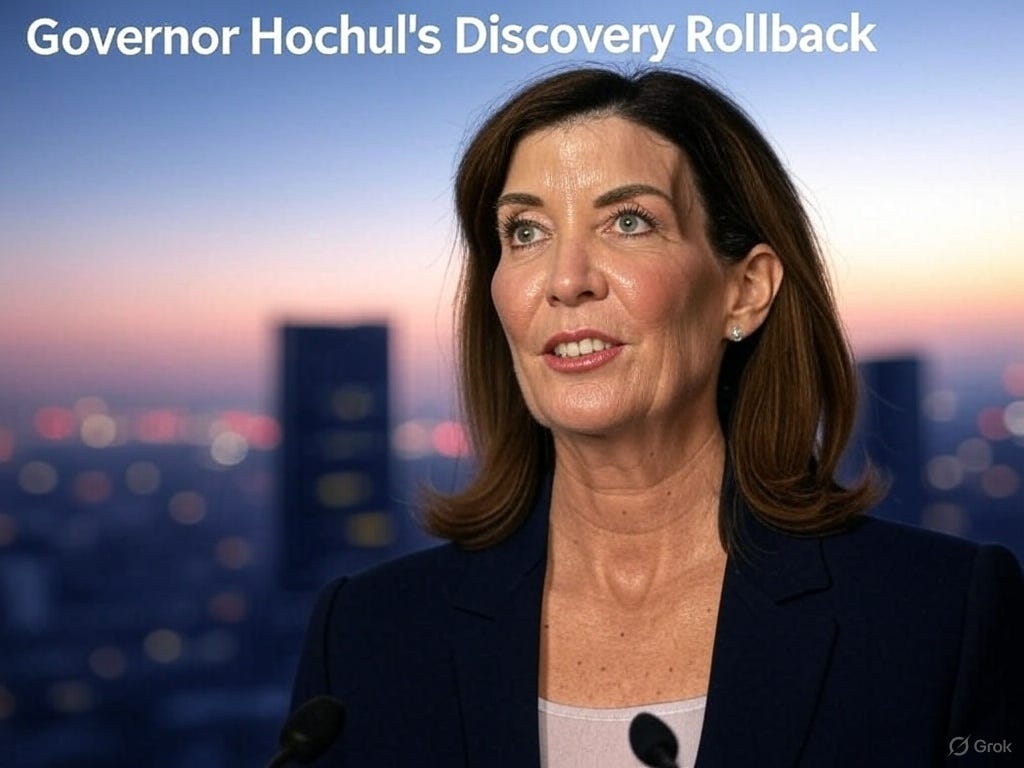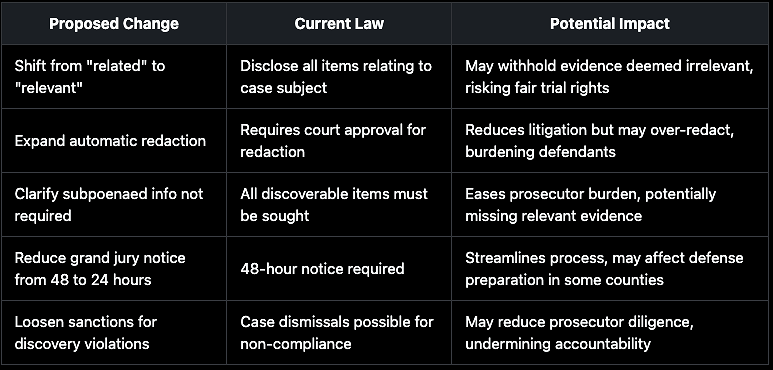Hochul’s New York Discovery Rollback: Stripping Away Fair Trial Rights
The Quiet Erosion of Due Process in Albany
In the landscape of New York's criminal justice system, a contentious debate is unfolding over proposed amendments to the state's discovery laws, which dictate how evidence is shared between prosecutors and defendants. Governor Kathy Hochul's 2025 proposals, embedded within the state budget negotiations [^2], aim to "streamline" these laws, sparking significant opposition from legal scholars, defense attorneys, and civil rights groups. This survey note explores the historical context, proposed changes, and arguments on both sides, providing a comprehensive analysis for readers interested in the balance between prosecutorial efficiency and defendants' rights.
Historical Context: The 2019 Discovery Reforms
New York's discovery laws underwent a transformative overhaul in 2019 with the enactment of Criminal Procedure Law Article 245, effective January 1, 2020, and amended in April 2020 and April 2022 [^1]. Prior to these reforms, New York was among the states with the least discovery access for defendants, often allowing prosecutors to withhold critical evidence until the eve of trial, a practice known as "trial by ambush." This led to situations where defendants, lacking full information, were pressured into guilty pleas without understanding the case against them, undermining fair trial rights.
Hochul’s 2025 proposals will reverse the progress of the 2019 Discovery Reforms, returning New York to an era of "coercion, not evidence." For many defendants, especially the poor, this rollback exacerbates an already dire situation: take a plea deal or remain incarcerated until trial. Poor individuals often cannot afford bail or retain skilled attorneys to secure all necessary evidence during the critical discovery process, leaving them vulnerable to unfair outcomes.
The 2019 reforms, driven by advocacy from groups like the New York Civil Liberties Union, mandated that prosecutors disclose a comprehensive list of items under Article 245.20, including all written, recorded, or oral statements by the defendant, grand jury transcripts, witness contact information, law enforcement reports, and exculpatory evidence [^1]. This "open file discovery" approach, aligning New York with 46 other states, required disclosure within 20 days if the defendant is in custody, or 35 days if not, with supplemental discovery due 15 days before trial. The law also tied discovery compliance to speedy trial rights, potentially leading to case dismissals if prosecutors failed to comply.
A poignant example underscoring the necessity of these reforms is the case of Marty Tankleff, wrongfully convicted of murdering his parents in 1988. Prosecutors withheld evidence, including witness statements pointing to a possible hitman and the suspect's history of hiring violent actors, which could have exonerated him. Tankleff spent nearly 18 years in prison before being exonerated in 2007, highlighting how lack of discovery can lead to grave injustices. The 2019 reforms aimed to prevent such scenarios by ensuring early and broad evidence sharing, as detailed in New York Criminal Procedure Law Article 245 [^1].
Proposed Changes by Governor Hochul
Governor Hochul's 2025 proposals, announced in her State of the State address on January 14, 2025, and included in the FY 2026 executive budget, seek to address perceived "unintended consequences" of the 2019 reforms. These changes, detailed in 2025 State of the State Book [^2], include:
Shifting the Disclosure Standard: Currently, Article 245.20(1) requires disclosure of "all items and information that relate to the subject matter of the case." The proposal would allow prosecutors to certify compliance once they have disclosed "all relevant materials" in their possession, as noted in a press release on January 31, 2025, from Gov. Hochul announces proposals to streamline discovery laws [^8]. This shift from "related" to "relevant" gives prosecutors discretion to withhold evidence they deem irrelevant, potentially narrowing the scope of discovery.
Expanding Automatic Redaction: The proposal expands automatic redaction for sensitive information, such as witnesses' physical addresses and personal data unrelated to the case, without requiring court approval. Currently, redaction often necessitates a protective order under Article 245.70, but the new measure aims to reduce litigation, as per the same press release [^8].
Streamlining Compliance: It clarifies that information requiring subpoenas is not necessary for certifying compliance, and reduces the 48-hour notice requirement for presenting defendant’s statements to grand juries to 24 hours, aiding counties without five-day grand juries during extended weekends [^8].
These changes are intended to end procedural delays and prevent automatic dismissals, with Hochul arguing they align with efforts to lower crime rates, as seen in Fighting Recidivism: District Attorneys Endorse Governor Hochul’s Plan to Streamline Discovery Laws [^9].
Arguments Against the Changes
Opponents, including defense attorneys, legal scholars, and groups like the NAACP and Legal Aid Society, warn that the proposed changes could erode defendants' rights. They argue that shifting from "related" to "relevant" gives prosecutors excessive discretion, potentially withholding crucial evidence, reverting to pre-reform unfairness. Over 80 law professors from institutions like Yale, NYU, and Cornell signed a letter on February 25, 2025, urging lawmakers to reject the rollbacks, stating they would "effectively repeal" the 2020 reforms, leaving defendants "fighting their cases in the dark," as reported in Rollbacks to discovery reforms will increase unfair prosecuting in NYC: law professors [^6].
Martin LaFalce, an assistant professor at St. John’s University, remarked, "There's no question that the proposals that the governor has put forward, clearly authored by prosecutors, would operate as a repeal of discovery reform as we know it," in Gov. Kathy Hochul wants to "streamline" NY's discovery law. Some say she's trying to kill it [^7]. Critics fear this could lead to scenarios like Tankleff's, where withheld evidence results in wrongful convictions, emphasizing the current law's role in ensuring fair trials.
The expansion of automatic redaction powers is another concern, with opponents arguing it could lead to over-redaction without judicial oversight, potentially withholding relevant information. While the proposal specifies redacting "sensitive details, such as witnesses’ physical addresses and personal data unrelated to the case," critics worry about prosecutorial discretion, though defenses can challenge redactions under existing mechanisms like Article 245.70, as noted in the State of the State book [^2].
Opponents also challenge the narrative that dismissals are solely due to discovery laws, suggesting resource constraints or policing changes contribute, advocating for increased funding rather than weakening the law, as per Pushback grows to Hochul's proposed discovery changes [^4].
A Threat to the Rule of Law and Fair Trials
The concerns about Governor Hochul's proposed changes extend beyond legal technicalities to fundamental principles of justice. Critics, including public defenders and civil rights advocates, argue that these changes threaten the rule of law and the right to a fair trial.
Undermining Transparency and Fairness
By altering the discovery standard from "related" to "relevant," prosecutors gain the discretion to decide what evidence is shared with the defense. This shift could allow prosecutors to withhold evidence they deem irrelevant, potentially including exculpatory evidence that could exonerate the defendant. Such discretion raises the risk of "trial by ambush," where defendants are unprepared for evidence presented at trial, directly compromising their ability to mount an effective defense, as noted in New York Daily News Rollbacks to discovery reforms will increase unfair prosecuting in NYC: law professors.
Weakening Accountability for Prosecutors
The proposal to loosen sanctions for discovery violations is particularly alarming to opponents. Currently, failure to comply with discovery requirements can lead to case dismissals, serving as a crucial mechanism to enforce timely and complete evidence sharing. Reducing these consequences may embolden prosecutors to be less diligent, potentially violating defendants' rights without fear of repercussion. Assemblymember Gabriella Romero has pointed out that judges already possess a range of lesser penalties, suggesting that the existing framework is sufficient and that further loosening could undermine accountability, as per Spectrum News Pushback grows to Hochul's proposed discovery changes.
Redaction Without Oversight
Allowing prosecutors to redact materials without court approval is seen as granting unchecked power that could be abused. While the intent is to protect sensitive information, such as witness addresses, critics fear that this authority could be used to conceal evidence beneficial to the defense. This lack of judicial oversight is viewed as a departure from due process, a fundamental aspect of the rule of law, as reflected in concerns raised in WXXI News Gov. Kathy Hochul wants to streamline NY's discovery law. Some say she's trying to kill it.
Perceived Rollback of Progress
The 2019 discovery reforms were celebrated as a significant advancement in ensuring fairness in the criminal justice system. By requiring comprehensive and early disclosure of evidence, these reforms aimed to prevent wrongful convictions and coerced pleas. Hochul's proposed changes are perceived by many as a regression to a system where defendants are at a disadvantage, forced to navigate their cases without full knowledge of the evidence against them. This is seen as a betrayal of the progress made and a disregard for the rights of defendants, echoing sentiments in New York Daily News Rollbacks to discovery reforms will increase unfair prosecuting in NYC: law professors.
Current Status and Implications
As of April 7, 2025, budget negotiations are stalled, with Hochul holding firm on her proposals, including discovery law changes, as reported in Hochul holds line on discovery reform, involuntary commitment as New York budget talks pass deadline [^12]. The outcome will shape the balance between efficiency and fairness, with potential impacts on case processing times, conviction rates, and defendants' rights, reflecting ongoing tensions in New York's criminal justice reform.
Table: Summary of Key Proposed Changes and Impacts
Hochul’s 2025 discovery law changes prioritize prosecutorial efficiency over defendants’ due process rights.
[^1]: New York Criminal Procedure Law Article 245, https://ypdcrime.com/cpl/article245.php
[^2]: New York State Governor's Office 2025 State of the State Book, https://www.governor.ny.gov/sites/default/files/2025-01/2025StateoftheStateBook.pdf
[^3]: POLITICO, "The push to change discovery law gathers steam," https://www.politico.com/newsletters/new-york-playbook-pm/2025/01/30/discovery-law-new-york-albany-legislature-session-hochul-00201625
[^4]: Spectrum News, "Pushback grows to Hochul's proposed discovery changes," https://spectrumlocalnews.com/nys/central-ny/politics/2025/03/04/pushback-grows-to-hochul-s-proposed-discovery-changes
[^5]: City Journal, "Fixing New York’s Broken Discovery Law Would Help Victims Get Justice," https://www.city-journal.org/article/new-york-discovery-law-criminal-case-dismissals-justice
[^6]: New York Daily News, "Rollbacks to discovery reforms will increase unfair prosecuting in NYC: law professors," https://www.nydailynews.com/2025/02/25/rollbacks-to-discovery-reforms-will-increase-unfair-prosecuting-in-nyc-law-professors/
[^7]: WXXI News, "Gov. Kathy Hochul wants to 'streamline' NY's discovery law. Some say she's trying to kill it," https://www.wxxinews.org/new-york-public-news-network/2025-03-17/gov-kathy-hochul-wants-to-streamline-nys-discovery-law-some-say-shes-trying-to-kill-it
[^8]: "Gov. Hochul announces proposals to streamline discovery laws," https://cnycentral.com/news/new-york-news/hochul-01-31-2025
[^9]: "Fighting Recidivism: District Attorneys Endorse Governor Hochul’s Plan to Streamline Discovery Laws," https://www.governor.ny.gov/news/fighting-recidivism-district-attorneys-endorse-governor-hochuls-plan-streamline-discovery-laws
[^10]: Spectrum News, "As leaders resist Hochul's discovery proposal, a look at the main alternative," https://spectrumlocalnews.com/nys/central-ny/politics/2025/03/24/comparing-discovery-reform-proposals-
[^11]: NY1, "Gov. Hochul tries to undo 2019 discovery law, stalls budget talks," https://ny1.com/nyc/all-boroughs/politics/2025/03/28/gov--hochul-tries-to-undo-2019-discovery-law--stalls-budget-talks
[^12]: Finger Lakes 1, "Hochul holds line on discovery reform, involuntary commitment as New York budget talks pass deadline," https://www.fingerlakes1.com/2025/04/01/new-york-budget-hochul-discovery-involuntary-commitment-2025/



